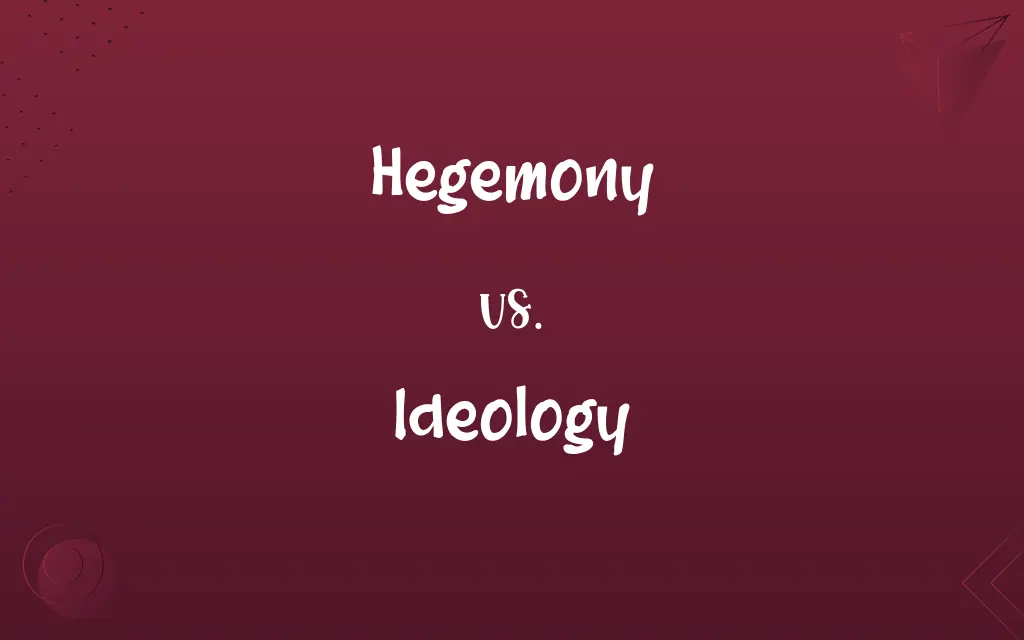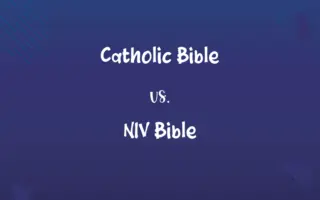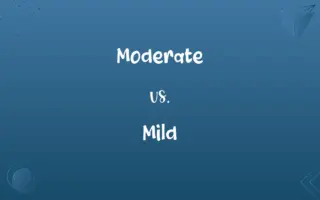Hegemony vs. Ideology: Know the Difference

By Shumaila Saeed || Published on January 3, 2024
Hegemony refers to dominant influence or control, often culturally or politically, whereas ideology is a system of beliefs, values, or ideals shared by a group.

Key Differences
Hegemony often implies a form of dominance achieved through cultural, social, or economic influence, where one group or state exerts control over others, often subtly and indirectly. Ideology, in contrast, is a set of beliefs, values, or ideals that form the basis of a social, economic, or political theory and policy, guiding the actions and perceptions of individuals or groups.
Shumaila Saeed
Jan 03, 2024
While hegemony is about maintaining and exerting power or influence, often by a dominant group or state over others, ideology is concerned with the ideas and beliefs that underpin such power structures. Hegemonic power can use ideology as a tool to maintain its dominance, shaping the prevailing ideas and beliefs to align with its interests.
Shumaila Saeed
Jan 03, 2024
Hegemony can manifest in various forms, including cultural hegemony, where a particular culture becomes dominant, influencing and shaping societal norms and practices. Ideology, however, is broader in scope, encompassing a wide range of beliefs and values that can influence political systems, economic theories, and social structures.
Shumaila Saeed
Jan 03, 2024
Hegemony is often more concerned with practice and the exercise of influence, whereas ideology is more about the theoretical framework that guides these practices. Hegemonic power may use ideological constructs to justify or legitimize its dominance.
Shumaila Saeed
Jan 03, 2024
Hegemony and ideology are interconnected, with hegemony often relying on ideological support to maintain its dominance, and ideology being shaped and influenced by the hegemonic powers in a society. Both play crucial roles in shaping the dynamics of power and belief systems within societies.
Shumaila Saeed
Jan 03, 2024
ADVERTISEMENT
Comparison Chart
Definition
Dominant influence or control by one group over others
A system of ideas and ideals, especially forming the basis of economic or political theory
Shumaila Saeed
Jan 03, 2024
Manifestation
Often through cultural, political, or economic dominance
Through shared ideas and beliefs that guide behavior
Shumaila Saeed
Jan 03, 2024
Role in Society
Maintains and exerts power structures
Provides a theoretical framework for understanding and interpreting the world
Shumaila Saeed
Jan 03, 2024
Relationship to Power
Directly involved in the exercise of power
Underpins and justifies power structures
Shumaila Saeed
Jan 03, 2024
ADVERTISEMENT
Hegemony and Ideology Definitions
Hegemony
Hegemony is the dominance of one group over another, often culturally or ideologically.
The cultural hegemony of Hollywood movies has influenced global film industries.
Shumaila Saeed
Dec 10, 2023
Ideology
Ideology is a system of ideas and ideals, especially one forming the basis of economic or political theory and policy.
The ideology of democracy emphasizes freedom and equality.
Shumaila Saeed
Dec 10, 2023
Hegemony
Hegemony refers to the influence exerted by a dominant country over others.
The United States' military and economic hegemony has been a topic of debate in international relations.
Shumaila Saeed
Dec 10, 2023
Ideology
Ideology can be the visionary theorizing of a systematic body of concepts, especially about human life or culture.
Her ideology about environmental conservation shaped her career choices.
Shumaila Saeed
Dec 10, 2023
Hegemony
Hegemony can be the leadership or dominance, especially by one state or social group over others.
The hegemony of the ruling party was evident in the way policies were implemented.
Shumaila Saeed
Dec 10, 2023
ADVERTISEMENT
Ideology
Ideology can describe a dominant set of ideas proposed by the state or media.
The government's ideology was reflected in its educational reforms.
Shumaila Saeed
Dec 10, 2023
Hegemony
Hegemony can describe a situation where one idea or product becomes dominant within a cultural or economic context.
The hegemony of fast food chains represents a shift in eating habits globally.
Shumaila Saeed
Dec 10, 2023
Ideology
Ideology refers to a set of beliefs characteristic of a social group or individual.
His political actions were heavily influenced by his personal ideology.
Shumaila Saeed
Dec 10, 2023
Hegemony
Hegemony also means the predominance of one state or ideology over others.
During the Cold War, the hegemony of the Soviet Union in Eastern Europe was marked by control and influence.
Shumaila Saeed
Dec 10, 2023
Ideology
Ideology also means the manner or content of thinking characteristic of an individual, group, or culture.
The company's ideology focuses on innovation and creativity.
Shumaila Saeed
Dec 10, 2023
Ideology
A set of doctrines or beliefs that are shared by the members of a social group or that form the basis of a political, economic, or other system.
Shumaila Saeed
Dec 10, 2023
Hegemony
(formal) Domination, influence, or authority over another, especially by one political group over a society or by one nation over others.
Shumaila Saeed
Dec 10, 2023
Ideology
Doctrine, philosophy, body of beliefs or principles belonging to an individual or group.
A dictatorship bans things, that do not conform to its ideology, to secure its reign.
Shumaila Saeed
Dec 10, 2023
Hegemony
Dominance of one social group over another, such that the ruling group or hegemon acquires some degree of consent from the subordinate, as opposed to dominance purely by force.
The two political parties battled viciously for hegemony.
Shumaila Saeed
Dec 10, 2023
Hegemony
Leadership; preponderant influence or authority; - usually applied to the relation of a government or state to its neighbors or confederates.
Shumaila Saeed
Dec 10, 2023
Ideology
A theory of the origin of ideas which derives them exclusively from sensation.
Shumaila Saeed
Dec 10, 2023
Ideology
A set or system of theories and beliefs held by an individual or group, especially about sociopolitical goals and methods to attain them; in common usage, ideology is such a set of beliefs so strongly held by their adherents as to cause them to ignore evidence against such beliefs, and thus fall into error - in this sense it is viewed as a negative trait; contrasted to pragmatism, and distinct from idealism.
Shumaila Saeed
Dec 10, 2023
Ideology
An orientation that characterizes the thinking of a group or nation
Shumaila Saeed
Dec 10, 2023
Repeatedly Asked Queries
What is hegemony?
Hegemony is the dominant influence or control of one group over others, often culturally or politically.
Shumaila Saeed
Jan 03, 2024
How does hegemony manifest in society?
Hegemony can manifest through cultural dominance, political leadership, or economic control exerted by one group over others.
Shumaila Saeed
Jan 03, 2024
What role does ideology play in politics?
Ideology provides the foundational beliefs and values that guide political theories and policies.
Shumaila Saeed
Jan 03, 2024
Is hegemony always negative?
Hegemony is often viewed critically due to its association with dominance and control, but it can also lead to stability and cultural integration.
Shumaila Saeed
Jan 03, 2024
Can there be multiple ideologies within a society?
Yes, diverse groups within a society can hold different ideologies, often leading to a pluralistic culture.
Shumaila Saeed
Jan 03, 2024
What is ideology?
Ideology is a set of beliefs, values, or ideals shared by a group, forming the basis of political, economic, or social theories.
Shumaila Saeed
Jan 03, 2024
Can hegemony and ideology coexist?
Yes, hegemony often uses ideology to maintain its dominance, while ideology can be shaped by hegemonic powers.
Shumaila Saeed
Jan 03, 2024
How does ideology influence individual behavior?
Ideology shapes individuals' perspectives, influencing their decisions and actions based on shared beliefs and values.
Shumaila Saeed
Jan 03, 2024
How do hegemony and ideology affect culture?
Hegemony can shape cultural norms and practices, while ideology influences cultural values and beliefs.
Shumaila Saeed
Jan 03, 2024
What is an example of a political ideology?
Communism, emphasizing collective ownership and classless society, is an example of a political ideology.
Shumaila Saeed
Jan 03, 2024
How do media contribute to ideology?
Media play a significant role in shaping and disseminating ideologies by framing information and cultural narratives.
Shumaila Saeed
Jan 03, 2024
What is an example of hegemony in history?
The British Empire's global dominance in the 19th century is an example of hegemony.
Shumaila Saeed
Jan 03, 2024
Can ideologies change over time?
Yes, ideologies can evolve as societies and cultures change, reflecting new beliefs and values.
Shumaila Saeed
Jan 03, 2024
What is cultural hegemony?
Cultural hegemony refers to the dominance of one culture's values and practices over others within a society.
Shumaila Saeed
Jan 03, 2024
Can ideology be independent of hegemony?
While influenced by hegemony, ideologies can also develop independently, reflecting grassroots movements or intellectual thought.
Shumaila Saeed
Jan 03, 2024
Is hegemony a form of power?
Yes, hegemony is a form of power exerted through influence and control, rather than direct coercion.
Shumaila Saeed
Jan 03, 2024
Can hegemony be challenged?
Hegemony can be challenged through social movements, political changes, or cultural shifts.
Shumaila Saeed
Jan 03, 2024
How do ideologies spread?
Ideologies spread through education, media, political discourse, and social interactions.
Shumaila Saeed
Jan 03, 2024
Is hegemony always intentional?
Hegemony can be both intentional and unintentional, as dominance can occur subtly over time.
Shumaila Saeed
Jan 03, 2024
Does ideology shape economic systems?
Yes, economic systems are often based on underlying ideologies, such as capitalism or socialism.
Shumaila Saeed
Jan 03, 2024
Share this page
Link for your blog / website
HTML
Link to share via messenger
About Author
Written by
Shumaila SaeedShumaila Saeed, an expert content creator with 6 years of experience, specializes in distilling complex topics into easily digestible comparisons, shining a light on the nuances that both inform and educate readers with clarity and accuracy.































































